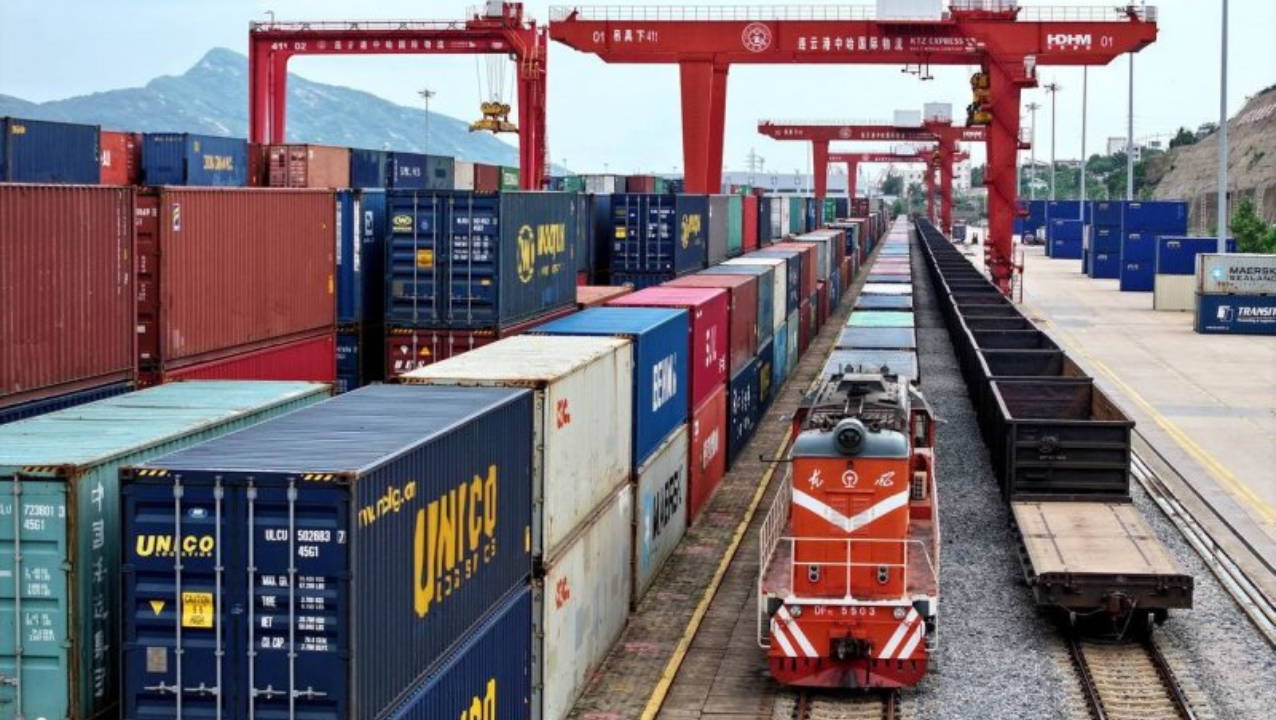Rail Freight from Tajikistan to Europe – Part of the Modern Silk Road Corridor
The growing demand for efficient east-west logistics has turned rail freight from Tajikistan to Europe into a vital component of the Silk Road Logistics network.
As traditional maritime routes face congestion and instability, Central Asian exporters are increasingly shifting toward the Trans-Caspian International Transport Route (TITR) — also known as the Middle Corridor.
This corridor connects Tajikistan, Uzbekistan, Kazakhstan, the Caspian Sea, Azerbaijan, Georgia, Turkey, and the European Union, offering a shorter, safer, and greener alternative to the Suez Canal route.
With a coordinated system of railways, ferries, and ports, it allows Tajik companies to deliver goods to Europe within 18–22 days, cutting transit time nearly in half compared to maritime transport.
Strategic Route Overview

Tajikistan’s Emerging Role in Eurasian Logistics
Landlocked but strategically located in the heart of Central Asia, Tajikistan is integrating rapidly into the Silk Road transport ecosystem.
Its rail network connects through Uzbekistan and Kazakhstan, linking directly to the Caspian Sea ports of Aktau (Kazakhstan) and Turkmenbashi (Turkmenistan).
From there, ferries cross the Caspian to Baku (Azerbaijan) — the main logistics gateway to the Caucasus, Turkey, and Europe.
Route Chain
Tajikistan → Uzbekistan → Kazakhstan → Caspian Sea → Azerbaijan → Georgia → Turkey → Europe (Germany, Poland, Italy, etc.)
Each link in this chain operates under harmonized standards, supported by international transport agreements and digital tracking systems.
Average total route length: ~7,000 km
Average delivery time (rail only): 18–22 days
Modes: rail + sea ferry + rail / road

Infrastructure and Key Transit Points
1. Central Asia Segment
-
Dushanbe → Tashkent (Uzbekistan) – containerized cargo departure
-
Tashkent → Aktau (Kazakhstan) – rail connection to Caspian ferries
-
Freight consolidation at Khorgos Dry Port (China border) for east-bound return loads
2. Caspian Segment
-
Port Aktau (Kazakhstan) – major terminal for rail-to-ferry operations
-
Caspian Sea ferry – ships cargo to Port Baku (Alat) within 2–3 days
-
Specialized ferries handle container, bulk, and project cargo
3. Caucasus Segment
-
Port Baku (Azerbaijan) – modern logistics hub handling up to 100,000 TEU annually
-
Rail transfer via Baku–Tbilisi–Kars (BTK) railway to Georgia and Turkey
-
Ports of Poti and Batumi (Georgia) – onward connections to the Black Sea and Europe
4. European Access Points
-
Entry via Turkey’s Kars and Istanbul terminals
-
Distribution to Germany, Poland, Italy, Hungary, Czech Republic via European rail network

Sofmar Forwarding & Logistics — Full-Cycle Silk Road Solutions
Rail Freight Services from Tajikistan to Europe
Full-Cycle Solutions by Sofmar Forwarding & Logistics
Operating across Georgia, Azerbaijan, and Central Asia, Sofmar Forwarding & Logistics coordinates all segments of the Tajikistan–Europe rail corridor.
Container Rail Freight
-
FCL (Full Container Load) and LCL (Groupage) shipments
-
Temperature-controlled and dry containers
-
Tracking and documentation through unified logistics platforms
Project and Heavy Lift Cargo
-
Oversized and overweight cargo, machinery, transformers, and turbines
-
Handling at ports of Baku, Poti, and Batumi
-
Route planning, permits, and escort services
Multimodal Integration
-
Rail + Ferry + Rail combinations via Caspian crossings
-
Warehousing and customs at Baku Alat Free Economic Zone (AFEZ)
-
Distribution and last-mile delivery through Europe’s rail and trucking network
Customs Brokerage
-
Customs clearance in Azerbaijan, Georgia, and EU terminals
-
Preparation of transit declarations and export documents
-
Certified compliance with Eurasian and EU customs codes

Transit Times and Comparative Table
Below are indicative transit times for major destinations, comparing rail, multimodal, and sea options:
| Route | Rail Freight (TITR) | Multimodal (Rail + Ferry) | Maritime (via Persian Gulf) |
|---|---|---|---|
| Tajikistan → Poland | 18–20 days | 20–24 days | 40–45 days |
| Tajikistan → Germany | 19–22 days | 21–25 days | 42–46 days |
| Tajikistan → Italy (via Turkey) | 20–23 days | 22–26 days | 45–50 days |
| Tajikistan → Czech Republic | 18–21 days | 20–23 days | 41–44 days |
Advantages of Rail Freight from Tajikistan to Europe
-
Faster Transit: up to twice as fast as sea transport.
-
Lower Costs: optimal for bulk and containerized cargo.
-
Stable Operations: less affected by geopolitical or port congestion risks.
-
Sustainability: reduced emissions and efficient use of energy.
-
Comprehensive Coverage: full logistics chain by Sofmar – port, customs, delivery.
Return Route: Europe to Tajikistan
The corridor also supports reverse freight flows — Europe → Central Asia — enabling Tajik importers to access European goods through the same efficient infrastructure.
Common import categories:
-
Industrial and construction equipment
-
Automobiles and spare parts
-
Food products, beverages, and pharmaceuticals
-
Consumer goods and packaging materials
Transit time Europe → Tajikistan: 18–22 days by rail, 20–25 days multimodal.
The return route uses the same Caspian and Caucasus infrastructure, ensuring balanced two-way logistics efficiency.
Sofmar’s Role in Central Asian Rail Logistics
Sofmar Forwarding & Logistics acts as a unifying operator, linking Central Asian exporters with European markets.
Through offices and partners in Azerbaijan, Georgia, and the EU, Sofmar provides:
-
End-to-end cargo coordination
-
Transparent pricing and tracking
-
Customs and documentation management
-
Port handling and storage solutions
The company’s strength lies in its integrated network — connecting Tajikistan, Uzbekistan, Kazakhstan, Azerbaijan, and Georgia under one operational chain.
Our agency’s office is located in the port of Poti at the address: Alley April 9, No. 30/39, Poti, Georgia.
If you need logistics, sea freight forwarding in Poti, please call our office: +995 493 22-02-66